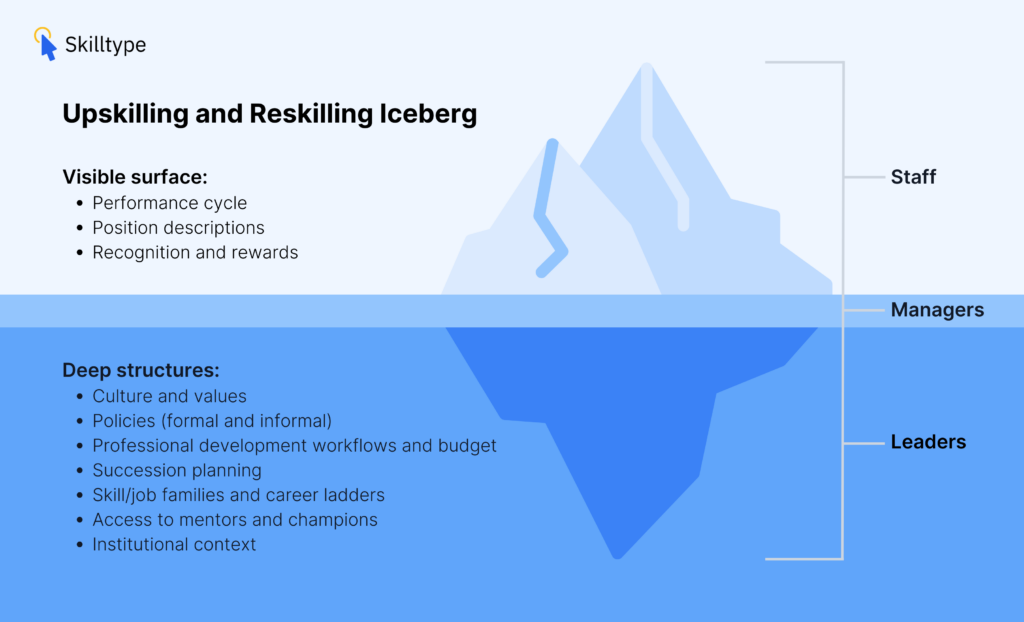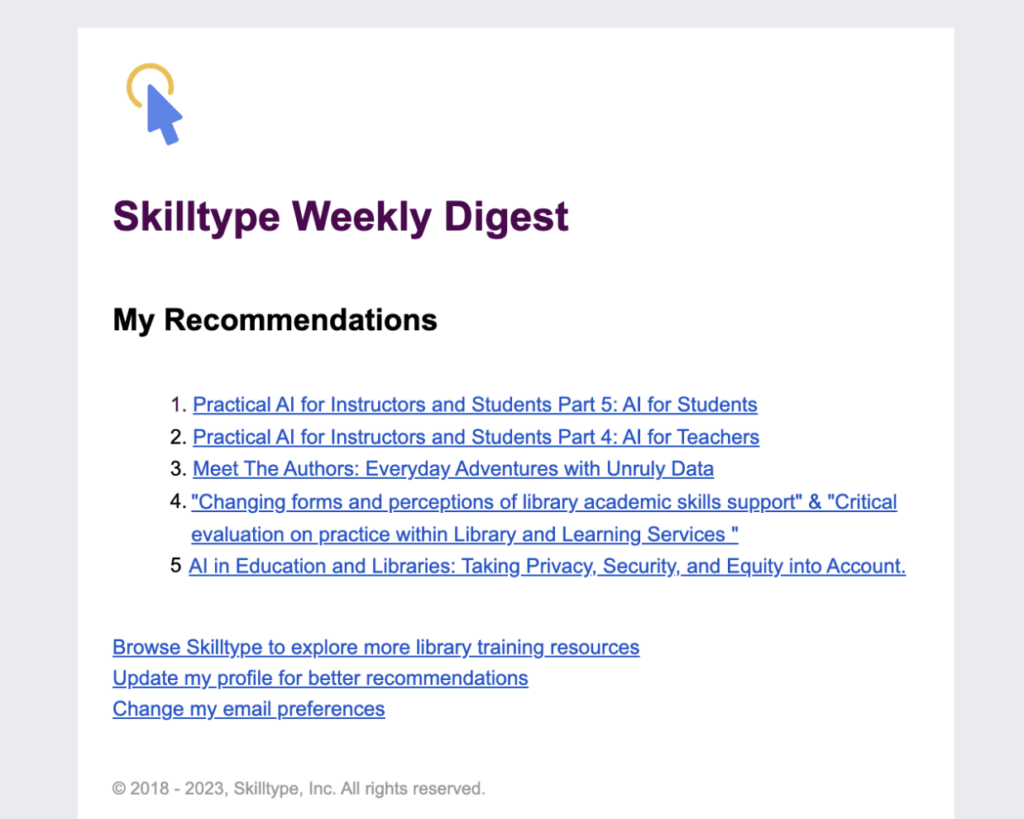In Skilltype’s conversations with leaders in the library community, we hear concurrent threads about the potential opportunities and disruptions to the industry because of artificial intelligence (AI) and an ongoing thread about the challenges of effective staff management within libraries. For libraries to undertake the comprehensive programs of upskilling and reskilling needed to adapt to this new reality, such as those described in “Reskilling in the Age of AI” in this month’s Harvard Business Review, leaders, managers, and employees must be fully involved. Leaders are actively engaging and asking questions with one another within venues such as the ARL and CNI, and sessions abound at library and archives conferences about AI to forecast the impact within the information ecosystem, publishing, and services landscape. In parallel, leaders are creating plans of action for the Age of AI within their organization’s strategic plans and talent strategy.
How managers can lead the way
Given that the need for upskilling and reskilling is becoming more urgent, Skilltype would like to shine a light on the role of managers in developing staff and facilitating opportunities that drive growth in the library industry workforce. Managers or supervisors are the tactical boots on the ground whose efforts can positively engage staff and accelerate a library’s adaptation to AI. However, managers often struggle to make time for people management and deepening their management expertise within wide portfolios of service or branch management, user requests, library committee meetings, and full email inboxes.

The manager’s role in cultivating upskilling and reskilling is most recognizable in the performance review workflow. Most libraries employ performance management practices based on institutional policies that encourage upskilling.
Managers work with staff to define goals that deepen their current skills. For instance, they might focus on enhancing the knowledge of circulation staff about customer service techniques to better serve new audiences. Similarly, a goal might be set to boost a cataloger’s proficiency with authority records within the metadata team.
However, reskilling for an entirely new role within the library isn’t yet standard practice in talent workflows. This remains true even if these new skills would benefit the library in the long run. For example, fostering in-house talent for in-demand digital roles can be a challenge, as such roles are highly sought-after and tough to fill.
If an interlibrary loan assistant suggests a goal to learn programming in Python so that they might join a digital initiatives department in the future, staff and managers may be required to make a formal request to use work hours to complete training or coursework that is outside of staff current responsibilities as a special exception. Upskilling has been the norm in many libraries. Still, to rise to the challenges of an AI-driven information landscape, we need to reskill into adjacent or complementary areas.
How Skilltype can help libraries with upskilling and reskilling
Skilltype aids libraries in laying a foundation for reskilling and upskilling, streamlining staff coordination. With our tools, managers address library upskilling needs effectively. Skilltype’s controlled vocabulary offers standardized data, helping managers gauge team competencies. Skilltype lets managers view and search team members’ skills, product experience, and interests. This enhances decision-making for tasks, schedules, and assignments. Managers access current skills and product info easily, saving time from manual searches. Managers can also access training on-demand about upskilling, reskilling, and staff development to fully seize opportunities.
Tailored training recommendations & skill development
Skilltype assists managers in guiding staff to skill development resources. This aids teams in addressing individual goals and team-wide upskilling and reskilling needs. During reviews or 1:1 conversations, managers can suggest specific skill topics. These include customer service, outreach, and reskilling in areas like artificial intelligence. When staff adds tags to their Skilltype profiles as interests, Skilltype automatically recommends relevant training. Each staff member receives these recommendations weekly through email and their homepage. Staff also get weekly digests, enhancing their current expertise and expanding their knowledge in areas vital to the library’s future.

Managers no longer need to search many conference websites and separate training portals to find and recommend training to staff. Staff with strong internal motivation to learn can follow their curiosity through Skilltype’s curated index of more than 9,000 training resources produced by library associations such as ALA, ACRL, OCLC, Lean Library, and more that covers every aspect of work in academic and public libraries and emerging data competencies through Skilltype’s search and browse pages.
When a supervisor has identified a learning goal to deepen the team’s expertise or fill a gap, team managers can create a Training List in Skilltype to share resources with the group. Skilltype sends notifications to team members when new resources are added. When staff has time to learn, Skilltype’s recommendations, manager-shared lists, or independent discovery offer ready resources.
Navigate upskilling and reskilling with Skilltype
Reskilling will be a significant part of every library’s staffing strategy. Skilltype is ready to help, and more than 150 libraries trust Skilltype to support their upskilling and reskilling efforts. Contact sales for a demonstration. Skilltype and Technology from Sage have collaborated to analyze librarians’ and knowledge workers’ current skills. They aim to predict future skill trends and pinpoint core information roles in AI-driven libraries. They also aim to identify new skills essential for serving user communities. View the previously released Librarian Futures series and set a reminder for the new installment in November 2023. Also, look out for ongoing improvements to the Skilltype platform to help libraries and librarians adapt to the vibrant future ahead.